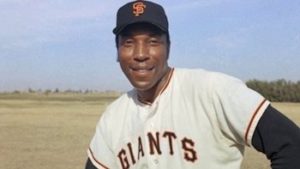
Willie McCovey
*Willie McCovey was born on this date in 1938. He was a Black professional baseball player.
Willie Lee McCovey was born in Mobile, Alabama, the seventh of ten children born to Frank and Esther McCovey. He began working part-time at the age of 12 and dropped out of high school without graduating to work full-time. McCovey played baseball in the Class AA Southern League, but due to segregation, he could not play when his team played in Shreveport, Louisiana. He later played for the Pacific Coast League Phoenix Giants just before joining the San Francisco Giants.
In his Major League debut on July 30, 1959, McCovey went four-for-four against Hall-of-Famer Robin Roberts of the Philadelphia Phillies with two singles and two triples. In 52 major league games, he had a .354 batting average and 13 home runs. He was named the National League's (NL) Rookie of the Year. He won the NL Player of the Month Award in August, his first month in the majors (.373, 8 HR, 22 RBI). He had a 22-game hitting streak, setting the mark for San Francisco Giants rookies.
Three years later, McCovey helped the Giants to the 1962 World Series against the New York Yankees, his only World Series appearance. In the bottom of the ninth inning of Game 7, with two outs and the Giants trailing 1–0, Willie Mays was on second base, and Matty Alou was on third base; any base hit would likely have won the championship for the Giants. McCovey hit a hard line drive snared by the Yankees' second baseman Bobby Richardson, ending the series with a Yankees win.
The moment was immortalized in two Peanuts comic strips. The first ran on December 22, 1962, with Charlie Brown lamenting, "Why couldn't McCovey have hit the ball just three feet higher?" The second, from January 28, 1963, features Charlie Brown pondering, "Or why couldn't McCovey have hit the ball even two feet higher?" McCovey and Willie Mays spent many years at the heart of the Giants' batting order.
His best year statistically was 1969, when he hit 45 home runs, had 126 RBI, and batted .320 to become the National League MVP. He won NL Player of the Month awards in July 1963 (.310, 13 HR, 27 RBI) and August 1969 (.315, 8, 22 RBI). He and Hank Aaron tied for the NL lead with 44 home runs. In the 20th-century years of Candlestick Park, where the Giants play, the stands in the right field were open except for three small bleacher sections. When McCovey came to bat, typically, those bleachers would empty as the fans positioned themselves on the flat ground, hoping to catch a McCovey home run ball, anticipating the gathering of boats in McCovey Cove.
In September 2003, he opened McCovey's Restaurant, a baseball-themed sports bar and restaurant in Walnut Creek, California. The restaurant closed in February 2015. McCovey was a senior advisor with the Giants for 18 years. In his role, he visited the team during spring training and the season, providing advice and other services. One of the most intimidating power hitters of his era, McCovey was called "the scariest hitter in baseball" by pitcher Bob Gibson, an assessment with which Reggie Jackson concurred. McCovey's powerful swing generated 521 home runs, 231 of which he hit in Candlestick Park, the most hit there by any player.
He played for the San Francisco Giants of Major League Baseball for 19 seasons and three more in MLB for the San Diego Padres and Oakland Athletics between 1959 and 1980. He batted and threw left-handed and was inducted into the Baseball Hall of Fame in 1986. In 1996, McCovey and Duke Snider pled guilty to federal tax fraud charges. According to the charges, they had failed to report about $10,000 in income from sports card shows and memorabilia sales from 1988 to 1990. He was given two years of probation and fined $5,000. President Barack Obama pardoned him on January 17, 2017. He was married to Karen McCovey and had a daughter. On August 1, 2018, McCovey married Estela Bejar at AT&T Park.
Willie McCovey died at the age of 80 at Stanford University Medical Center on October 31, 2018, following hospitalization for an infection.